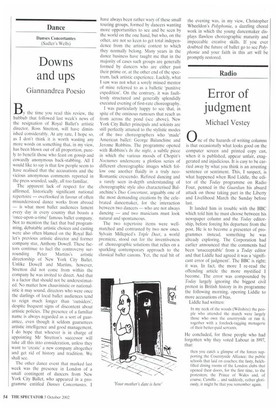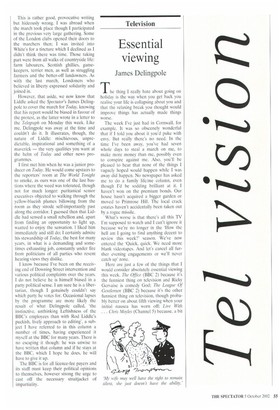Error of judgment
Michael Vestey
0 ne of the hazards of writing columns is that occasionally what looks good on the computer screen and printed copy can, when it is published, appear unfair, exaggerated and injudicious. It is easy to be carried away by what you think is an arresting sentence or sentiment. This, I suspect, is what happened when Rod Liddle, the editor of the Today programme on Radio Four, penned in the Guardian his absurd attack on those taking part in the Liberty and Livelihood March the Sunday before last.
It landed him in trouble with the BBC which told him he must choose between his newspaper column and the Today editorship, before forcing his departure from the post. He is to become a presenter of programmes instead, something he was already exploring. The Corporation had earlier announced that the comments had been 'unacceptable' from a Today editor and that Liddle had agreed it was a 'significant error of judgment'. The BBC is right: it was. In fact, the more I re-read the offending article the more mystified I become. The error was compounded by Today largely ignoring the biggest civil protest in British history in its programme the following morning, opening Liddle to more accusations of bias.
Liddle had written:
In my neck of the woods (Wiltshire) the people who attended the march were largely those who own the countryside or run it, together with a forelock-tugging menagerie of their better-paid servants.
He concluded, for those people who had forgotten why they voted Labour in 1997, that:
then you catch a glimpse of the forces supporting the Countryside Alliance: the public schools that laid on coaches; the fusty, belchfilled dining rooms of the London clubs that opened their doors, for the first time, to the protesters; the Prince of Wales and, of course, Camilla ... and suddenly, rather gloriously, it might be that you remember again.
This is rather good, provocative writing but hideously wrong. I was abroad when the march took place though I participated in the previous very large gathering. Some of the London clubs opened their doors to the marchers then; I was invited into White's for a tincture which I declined as I didn't think there was time. Those taking part were from all walks of countryside life: farm labourers, Scottish ghillies, gamekeepers, terrier men, as well as struggling farmers and the better-off landowners. As with the last march, Londoners who believed in liberty expressed solidarity and joined in.
However, that aside, we now know that Liddle asked the Spectator's James Deling pole to cover the march for Today, knowing that his report would be biased in favour of the protest, as the latter wrote in a letter to the Telegraph on Monday this week. Like me, Delingpole was away at the time and couldn't do it. It illustrates, though, the nature of Liddle: mischievous, unpredictable, inspirational and something of a maverick — the very qualities you want at the helm of Today and other news programmes.
I first met him when he was a junior producer on Today. He would come upstairs to the reporters' room at The Work! Tonight to smoke, as ours was one of the last bastions where the weed was tolerated, though not for much longer: puritanical senior executives objected to walking through the yellow-blueish plumes billowing from the room as they strode self-importantly past along the corridor. I guessed then that Liddle had sensed a small rebellion and, apart from finding an opportunity to light up, wanted to enjoy the sensation. I liked him immediately and still do; I certainly admire his stewardship of Today, the best for many years, in what is a demanding and sometimes exhausting job, constantly under fire from politicians of all parties who resent hearing views they dislike.
I know because I've been on the receiving end of Downing Street intervention and various political complaints over the years.
I do not believe he is himself biased in a party political sense. I am sure he is a liber
tarian, though I genuinely couldn't say which party he votes for. Occasional lapses by the programme are more likely the result of what Delingpole called, 'the instinctive, unthinking Leftishness of the BBC's employees than with Rod Liddle's puckish, lively approach to editing', a sub
ject I have referred to in this column a number of times, having experienced it
myself at the BBC for many years. There is no escaping it though: he was unwise to have written that column and if he stays at the BBC, which I hope he does, he will have to give it up.
The BBC is for all licence-fee payers and its staff must keep their political opinions to themselves, however strong the urge to cast off the necessary straitjacket of impartiality.





































































 Previous page
Previous page